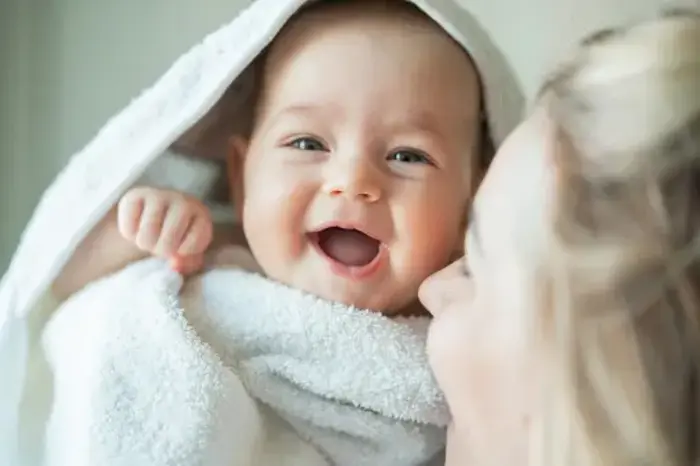Adverts
The development of babies in the first two years of life is an incredible journey, marked by several important stages. From the first smile to the first steps, each phase is a milestone in the baby's cognitive, emotional and physical development.
This article explores the five crucial phases that highlight these significant advances. In these formative years, interaction between babies and their caregivers is key to stimulating brain development, promoting language skills, social recognition and even fine motor skills.
Adverts
Furthermore, it is a time when parents and caregivers begin to notice the emergence of the baby's unique personality, likes and dislikes, while witnessing the awakening of curiosity and exploration of the world around them.
Every smile, babble, movement and interaction is a cornerstone in building the foundation for future learning, emotional health and social bonds. Therefore, understanding and supporting these stages not only strengthens the connection between parents and children, but also optimizes the baby's development, ensuring a smooth transition to subsequent stages of childhood.
Adverts
The First Social Smile
Around the third month, the baby begins to smile socially, a manifestation of affection that is not merely an internal reaction, but a meaningful interaction with the world around. Furthermore, this phase marks the development of control over the neck and head, with the baby beginning to take objects into the mouth, preparing for future teeth.
This smile, known as a social smile, is a sign of recognition and response to people who are familiar to them, such as parents and siblings, and represents an important milestone in emotional and social development. In addition to its emotional importance, the beginning of the oral phase, where everything ends up in the baby's mouth, has a biological reason, as it helps in the development of the muscles necessary for future feeding and speech.
Adverts
This period is also crucial for sensory development, as by exploring objects with their mouths, babies learn about textures, temperatures and flavors, enriching their sensory perception. The ability to hold objects and bring them to the mouth also demonstrates a significant advance in hand-eye coordination, paving the way for more complex motor skills..
Discovery and Exploration of Babies
Reaching six months, the baby is able to sit with support and shows a greater interest in the environment, interacting with toys and beginning to express their wishes, for example, showing discomfort when losing sight of their parents.
Adverts
This phase is crucial not only for motor development, but also for cognitive and emotional development. The baby begins to develop a deeper understanding of his relationship with the environment and the people around him.
The ability to roll over, reach objects with the hands and the beginning of babbling are important milestones, which show progress in motor coordination and communication. Recognizing familiar people, reacting to facial expressions and imitating some gestures and sounds reinforce social interaction.
Furthermore, separation anxiety may become evident, a natural phase of emotional development, where the baby demonstrates a clear preference for parents and close caregivers. This period is a window to reinforce emotional bonds, with playful activities that stimulate sensory and motor development, preparing the baby for the next stages of growth.
Crawling and Early Independence
At around seven to eight months, babies begin to crawl, a crucial milestone that not only develops physical strength but also promotes independence. This phase is marked by growing curiosity and the development of fine motor skills, such as precision in pincer movement.
During this period, the baby also begins to sit without support, which represents a significant advance in coordination and balance. The ability to transfer objects from one hand to another and discovering how objects interact with each other are fundamental aspects of this phase, indicating accelerated cognitive development.
Furthermore, social interaction intensifies, as babies begin to understand simple commands and respond to gestures, consolidating the foundations for non-verbal communication.
Crawling not only strengthens muscles and joints, preparing them for upcoming physical challenges, such as standing and walking, but also stimulates spatial awareness, visual-motor coordination and autonomous exploration of the environment.
First Words and Steps
Between nine and twelve months, babies begin to experiment with sounds to communicate their needs and feelings, a fundamental step that opens the door to effective communication. During this period, they not only recognize their names but also respond to simple commands and express varied emotions through gestures and vocalizations.
By the age of one, many are ready to take their first steps without assistance, a milestone that reflects not only physical independence but also confidence and curiosity in exploring the environment around them. These advances in locomotion and communication signal significant growth in independence and social skills.
Additionally, the development of fine motor skills, such as the ability to use fingers to pick up small objects, complements their growing autonomy and desire to interact with the world in more complex ways.

The ability to understand and, in some cases, follow instructions shows remarkable cognitive development, preparing them for even more advanced stages of learning and socialization.
Development of Babies' Autonomy
From eighteen to twenty-four months, babies become even more curious about the world around them, showing clear preferences and beginning to form simple sentences. This phase is also marked by more independent exploration and the development of more complex social skills.
During this period, the ability to run and climb small obstacles emerges, which requires constant vigilance from parents. Imitation of adult behaviors becomes common, reflecting the baby's desire to participate in the world around him and to learn through observation.
The games gain a new level of complexity, involving pretend games that stimulate the imagination and understanding of abstract concepts. Additionally, speech development accelerates, with babies significantly increasing their vocabulary and beginning to use sentences of two or more words, allowing them to express their ideas and desires more clearly.
This progress in communication opens new doors for social interaction, as they begin to better understand and follow simple instructions, while also showing the ability to express affection and demonstrate empathy for others.
Conclusion
The first stages of babies' development are fundamental to their growth and formation as individuals. Each milestone, from the social smile to the first steps and words, not only reflects physical and cognitive progress, but also emotional and social progress.
Watching and supporting your baby through these stages is a rewarding journey for parents and caregivers, setting the stage for healthy development in the years to come. This attentive monitoring allows parents to not only celebrate each new achievement, but also to detect early any deviation from typical development, enabling timely interventions.
Furthermore, adequate interaction and stimulation during these early stages are crucial for fostering the development of language, motor skills, cognition and emotional bonds. Through games, conversations and reading, parents can enrich the baby's environment, making it more conducive to learning and exploration.
Establishing routines, offering a safe environment for exploration and responding sensitively to the baby's needs are practices that contribute significantly to the child's well-being and development, solidifying the basis for the acquisition of more complex skills in the future.
